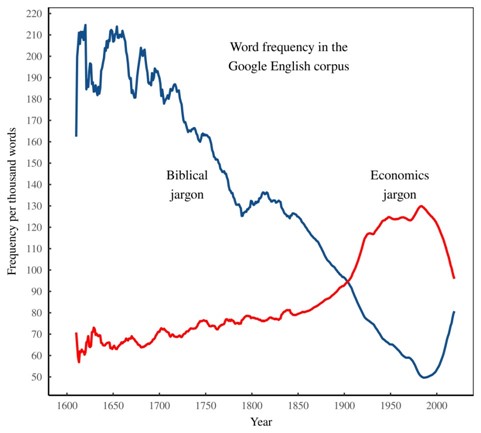From Blair Fix We’re now in a position to look at the changing ideological landscape that is written in the English language. To quantify ideological change, I measure how the frequency of biblical/economics jargon has changed with time in the Google English corpus. Figure 10 shows my results. Here the blue line shows the annual frequency of biblical jargon. The red line shows the annual frequency of economics jargon. Note that the frequency is expressed per thousand words, so you can interpret it like a batting average. For example, during the 1950s, for every 1000 words contained within the Google corpus, about 130 of them were economics jargon. (If our economics jargon ‘batted’ 1000, it would mean that English writing consisted entirely of economics jargon.) Figure 10: The changing
Topics:
Editor considers the following as important: Uncategorized
This could be interesting, too:
tom writes The Ukraine war and Europe’s deepening march of folly
Stavros Mavroudeas writes CfP of Marxist Macroeconomic Modelling workgroup – 18th WAPE Forum, Istanbul August 6-8, 2025
Lars Pålsson Syll writes The pretence-of-knowledge syndrome
Dean Baker writes Crypto and Donald Trump’s strategic baseball card reserve
from Blair Fix
We’re now in a position to look at the changing ideological landscape that is written in the English language. To quantify ideological change, I measure how the frequency of biblical/economics jargon has changed with time in the Google English corpus.
Figure 10 shows my results. Here the blue line shows the annual frequency of biblical jargon. The red line shows the annual frequency of economics jargon. Note that the frequency is expressed per thousand words, so you can interpret it like a batting average. For example, during the 1950s, for every 1000 words contained within the Google corpus, about 130 of them were economics jargon. (If our economics jargon ‘batted’ 1000, it would mean that English writing consisted entirely of economics jargon.)
Figure 10: The changing frequency of biblical and economics jargon in the Google English corpus.
Each line shows the frequency of biblical/economics jargon within the Google English corpus. I define ‘economics jargon’ as the 1000 most overused words from the jargon quadrant of Figure 2. And I define ‘biblical jargon’ as the 1000 most overused words from the jargon quadrant of Figure 6. In each year, I sum the frequency of these words in the Google corpus, and plot the pattern over time. To smooth the trends, each line shows the 10-year trailing average of jargon frequency. For more details about the data, see Sources and methods.
Looking at Figure 10, let’s start with what is unsurprising. Over the last four centuries, biblical jargon fell out of favor while economics jargon became more popular. This is exactly what we expect for the transition from feudalism to capitalism.
To give you a sense of the scale of this linguistic transformation, note that in the 17th century, English writing was overwhelmingly religious. For every 1000 words written during that period (and captured by the Google English corpus), on average about 200 of them were biblical jargon. That may not sound significant, until you realize that my sample of bibles themselves only ‘bat’ 300. In other words, for every
1000 words in these bibles, 300 of them are ‘jargon’. So it’s not an exaggeration to say that the English literature of the 17th century was dominated by theology.
From the 18th century onward, however, this christian hegemony steadily waned. At the same time, the jargon of economics grew more popular, becoming the dominant ideology around the turn of the 20th century.
While we should be cautious about interpreting these trends (because they depend in part on my analytic assumptions), they seem consistent with what we know both about the history of capitalism and about the history of economic thought. We know, for example, that the transition to capitalism has deep roots, but that the change accelerated during the late 19th century, as Western countries began to industrialize. We also know that the origin of modern-day economics dates back centuries, but that these ideas were not mainstream until after the marginal revolution of the late 19th century. So over all, the long-term pattern in Figure 10 meets our expectations.
That said, something conspicuous happened after 1980: the popularity of economics jargon began to wane, and the popularity of biblical jargon began to rise. What should we make of this reversal? Does it indicate that we (anglophones) have passed the peak of capitalist ideology? I think the answer is yes.
Reinforcing evidence
There is a saying in science that extraordinary claims require extraordinary evidence. I admit that I cannot muster ‘extraordinary’ evidence to back my claim that we’ve passed the peak of capitalist ideology. However, I can muster several independent lines of linguistic evidence that point to the same conclusion. In what follows, I look at . . . read lots more

